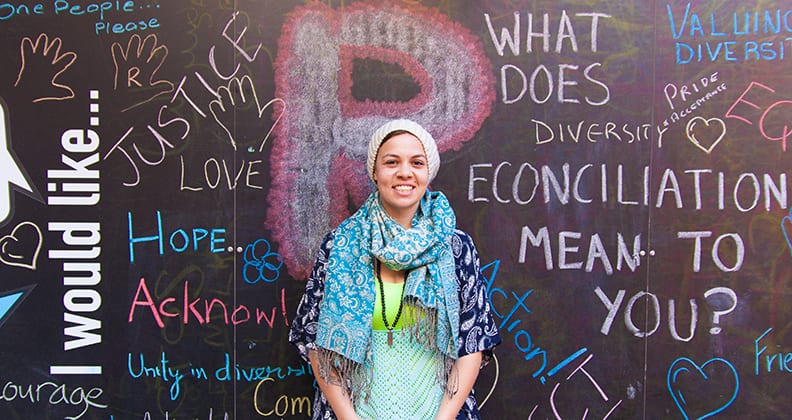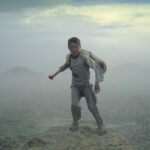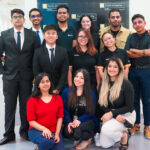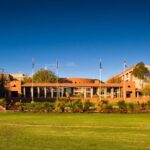When Sharleah Ramirez isn’t studying, she’s helping others follow their hearts. After completing the Indigenous Tertiary Enabling Course in 2013, Sharleah chose to follow her passions by studying anthropology and sociology. The inspirational student is now a member of the Guild Council and an Indigenous student representative on the Curtin Indigenous Policy Committee.
What has Curtin given you the opportunity to do?
Curtin has given me the chance to develop my skills analytically, socially and verbally in public settings. It’s given me a lot of opportunities to get involved within and around the community, and I do a lot of volunteer work here at the Centre for Aboriginal Studies. I also sit on the Guild Council as a councillor and on the Curtin Indigenous Policy Committee as an Indigenous student representative.
What is the Curtin Indigenous Policy Committee?
The Curtin Indigenous Policy Committee makes changes within the Curtin structure that involves Indigenous students. At the moment, they’re talking about Indigenous retention and completion rates, and what we can do to improve that by implementing new programs and workshops to benefit Indigenous students on campus. They’re also talking about changing the University’s policy to try to make Curtin more culturally appropriate by creating a new Indigenous structure model that can be implemented throughout the University.
How long do you have left to go at uni?
I was doing four units, but I recently dropped down to three. The year after next is when I’ll be finished. The reason I dropped to three units is so that I could be more involved around Curtin.
What’s your favourite thing about Curtin?
My favourite thing about Curtin is the laidback environment. I love the fact that people are always willing to help you out or assist you in any sort of way, shape or form. The biggest thing that I’ve gotten out of this place is the support, which has built me up so I can recognise opportunities for myself and help others. Without the support network, you’re out of the loop. I can always go back to my support network and say “look, what do you think about this?” or “what do you think I should do?”
What’s been your greatest struggle?
The greatest struggle for myself would be trying to find that balance between work, home and study. That’s been a major struggle because I’m so passionate about so many different things in my life and I want to be able to dedicate my full time and attention to projects. I’ve noticed that university has put a little bit of strain on my family life, as there is a lot of reading and reflective journal work I need to do for my majors.
If you could give one piece of advice to a group of people, what would it be?
Don’t commit until you know what you want to commit to. Go find out who you are and what your passions are, what your motivations are, what your inspirations are and find that little niche, then go out and pursue it. Allow yourself that grace period where you can find your feet. I know people who go to university and have no idea why they’re studying [the subject] they’re studying. I’ve come across other people, though, who are studying nursing or something else and they know what they want to do because they’ve recognised that helping people is what they want to do in life. Make sure you study something that you’re passionate about – something that you want to wake up every morning and do.
Is there anything in your life that influenced you to study anthropology and sociology?
I had one of those moments. I woke up one morning for work at 4.30, and I just looked at my steel caps and thought, “I don’t want to do this anymore”. I realised that I hated my lifestyle: waking up at 4.30 every single morning, going out, slaving away, coming home, eating dinner, going back to bed, waking up, doing the same thing.
I realised that money doesn’t make me happy and I thought that I should do something that I’m really passionate about. I just wanted to do something that was wholesome – something that’s different, something that’s out of the box, something that doesn’t restrict me, something that I can make my own name for. I realised that I didn’t need somebody else’s name to make me big because I’m good at what I already do just being me. I just need my credentials to back me up, so I can say, “this is the type of person that I am, this is what I’ve done and this is my track record.”
Where do you see yourself in five years’ time?
I’ll probably still be studying. I want to do my PhD and become a doctor before I’m 30 or at least near that age. At the end of the day, I’d like to work at Curtin because there’s so much opportunity around.
I think that Curtin could use a fresh set of eyes to help identify the gaps for Indigenous students on campus. I’d like to help resolve the issues surrounding Indigenous students at Curtin, such as retention and completion rates, helping Indigenous students connect with support services and creating a sense of community.
Is there anyone in particular that inspired your outlook on life?
I think the biggest thing that has inspired me is the past. Not so much people, but the past and what has happened. I’m also influenced by what is still happening now, which drives me in my everyday life.
Everything that I do isn’t just for me. I do it for my family, I do it for my old people past and present, I do it for my nieces and nephews and I do it for my community – how are they ever going to survive in this world if people like me don’t make it better for them in the future?



